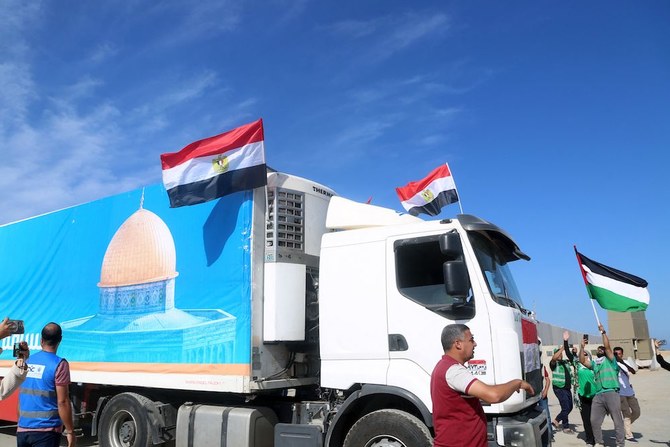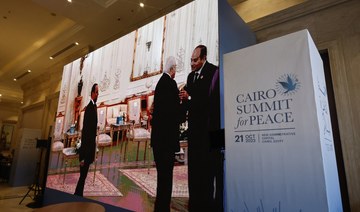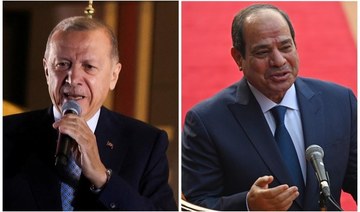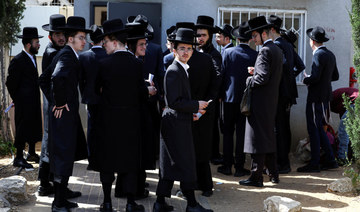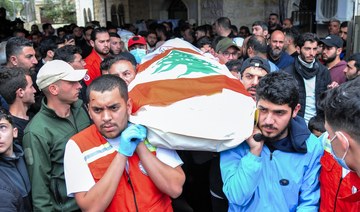CAIRO: Humanitarian aid trucks started entering the besieged Gaza Strip from the Rafah crossing in Egypt on Saturday.
The relief aid convoy included 20 trucks that carry medicine, medical supplies, and a limited amount of food supplies, Hamas's media office said.
Seven trucks have begun arriving inside Gaza Saturday afternoon, reported the World Health Organization (WHO).
Supplies included trauma medicines and supplies for 1200 people and 235 portable trauma bags for on-the-spot stabilization of injured patients, the WHO said as it confirmed working with Egyptian and Palestinian Red Crescent Societies to ensure safe passage of supplies.
Egyptian state TV showed trucks that have been waiting for days entering the border crossing area from Egypt’s Sinai Peninsula.
Egyptian media earlier said preparations were underway to open the Rafah crossing to allow the passage of trucks carrying humanitarian aid to Palestinians in Gaza.
Televised footage showed trucks moving towards the crossing in what appeared to be preparation to let trucks carrying humanitarian aid enter Gaza from Egypt.

Egyptian state TV showed trucks that have been waiting for days entering the border crossing area from Egypt’s Sinai Peninsula. (@Alqaheranewstv)
An AFP journalist on the Palestinian side of the crossing saw 36 empty trailers entering into the terminal and heading towards the Egyptian side, where they were to be loaded with the incoming aid.
Hamas said that expected truckloads of aid “will not change the catastrophic medical conditions in Gaza.”
The UN World Food Programme (WFP) welcomed the opening of the border crossing.
“This food is desperately needed as the conditions inside Gaza are truly catastrophic. These twenty trucks are an important first step, but this convoy has to be the first of many,” said WFP Executive Director, Cindy McCain. ”We must also have continuous, safe access for humanitarians and civilians inside Gaza, so that we can get this food to the people who so badly need it.”
WFP has another 930 metric tons of emergency food items at or near the Rafah border, ready to be brought into Gaza whenever access is allowed again. The stocks are needed to replenish WFP’s rapidly dwindling supplies inside Gaza.
The US Embassy in Israel said the Gaza-Egypt border may open on Saturday, suggesting that such a move would enable foreigners to leave the besieged Palestinian enclave.
In a social media post, the embassy said it had “received info” that the Rafah crossing would open at 10 a.m. (0700GMT).
“We do not know how long it will remain open for foreign citizens to depart Gaza,” it added.
Israel blockaded the territory and launched waves of punishing airstrikes following the Oct. 7 rampage by Hamas militants on towns in southern Israel.
The lorries had been waiting for days on the Egyptian side after Israel agreed to allow aid to enter following a request from its top ally the United States.

Supplies included trauma medicines and supplies for 1200 people and 235 portable trauma bags for on-the-spot stabilization of injured patients, the WHO said as it confirmed working with Egyptian and Palestinian Red Crescent Societies to ensure safe passage of supplies. (AFP)
UN humanitarian chief Martin Griffiths said the convoy “must not be the last” and that the delivery would start “a sustainable effort to provide essential supplies” to Gaza.
UN chief Antonio Guterres warned Friday that the aid was “the difference between life and death” for many Gazans, more than one million of whom have been displaced.
“Much more” aid needs to be sent, he told a peace summit in Egypt on Saturday.
Many in Gaza, reduced to eating one meal a day and without enough water to drink, are waiting desperately for the aid. Hospital workers were also in urgent need of medical supplies and fuel for their generators as they treat huge numbers of people wounded in the bombings.
Hundreds of foreign passport holders also waited to cross from Gaza to Egypt to escape the conflict.
Israel and Palestinian militants traded fire on Saturday after Hamas released an American woman and her teenage daughter, the first of some 200 captives to be freed after the militant group’s Oct. 7 rampage into Israel.
Israel has sealed off the territory for two weeks, forcing Palestinians to ration food and to drink filthy water from wells. Hospitals say they are running low on medicine and fuel for emergency generators amid a territory-wide blackout.
The release came amid growing expectations of a ground offensive that Israel says is aimed at rooting out the militant group, which has ruled Gaza for 16 years. Israel said Friday it does not plan to take long-term control over the tiny territory, home to some 2.3 million Palestinians.




